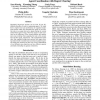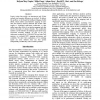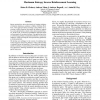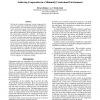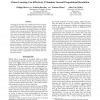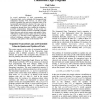AAAI
2008
14 years 2 months ago
2008
AAAI
2008
14 years 2 months ago
2008
Email client software is widely used for personal task management, a purpose for which it was not designed and is poorly suited. Past attempts to remedy the problem have focused o...
AAAI
2008
14 years 2 months ago
2008
Sequential single-item auctions can be used for the distributed allocation of tasks to cooperating agents. We study how to improve the team performance of sequential singleitem au...
AAAI
2008
14 years 2 months ago
2008
Legacy system data models can interoperate only if their syntactic and semantic differences are resolved. To address this problem, we developed the Intelligent Mapping Toolkit (IM...
AAAI
2008
14 years 2 months ago
2008
Recent research has shown the benefit of framing problems of imitation learning as solutions to Markov Decision Problems. This approach reduces learning to the problem of recoveri...
AAAI
2008
14 years 2 months ago
2008
We describe a simple environment to study cooperation between two agents and a method of achieving cooperation in that environment. The environment consists of randomly generated ...
AAAI
2008
14 years 2 months ago
2008
Currently, the most effective complete SAT solvers are based on the DPLL algorithm augmented by clause learning. These solvers can handle many real-world problems from application...
AAAI
2008
14 years 2 months ago
2008
The objective of this paper is to study the existing methods for unsupervised object recognition and image categorization and propose a model that can learn directly from the outp...
AAAI
2008
14 years 2 months ago
2008
In several applications of logic programming and Transaction Logic, such as, planning, trust management and independent Semantic Web Services, an action might produce incomplete f...
AAAI
2008
14 years 2 months ago
2008

